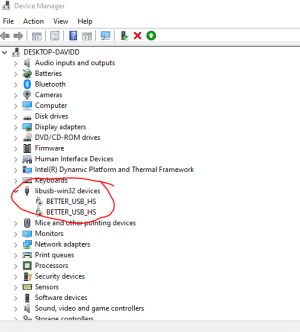Libusb Win32 Download:
Libusb is a comprehensive C library designed to ease interaction with USB devices. Specifically aimed at saving developers both time and effort when working with these devices. Compatible with all major platforms and protocol versions.
It can be used in two modes, as either a device driver or filter driver; with the former option being most popular.
Free and open-source:
Libusb-win32 download is an open-source software library designed to facilitate communication between USB devices and Windows-based systems. It supports various types of devices and provides the option for controlled transfers and low-level USB operations, making this program suitable for all Windows OS versions – making it an invaluable tool for developers and system administrators.
Libusb is written in C and designed to save developers both time and energy by offering a pre-written, peer-reviewed interface to USB hardware. It supports all major platforms – Linux, macOS, and Windows alike – as well as supporting all USB version protocols and operating modes without the need for kernel driver code.
Your PC needs modern USB drivers that work well with modern computers; unfortunately, generic USB drivers found online often don’t do. Written quickly in haste and potentially containing bugs that impede performance, they could also contain fake drivers which pose security threats and lead to data loss if downloaded and installed onto your system.
If you want to install a new USB driver, it is advised that you download and install the most up-to-date version from its developer’s website. Be sure that an administrator account exists before proceeding with installation steps.
Works on all major platforms:
Libusb Win32 Download is an open-source software tool that enables USB devices to communicate with Windows computers. Compatible with numerous operating systems – such as Windows 10 – this free program works well on most desktop computers while its primary advantage lies in offering reduced power consumption than many traditional driver solutions.
libusb is a C library that provides software developers with a generic interface to USB devices, designed to simplify writing programs that interact with USB devices. It’s designed for easy development across platforms using one API; version-agnostic so applications can use any version of the protocol!
Software developed for use with STM32 BOOTLOADER is available free from its developer’s website and should be installed either as a filter driver or class driver in Windows, although class driver mode offers more stability and security. Once the driver has been installed successfully, its performance can be checked using Windows Device Manager – if working, STM32 BOOTLOADER should appear under Control > Microcontrollers & Boards > Bootloaders/bootloader devices / Devices.
To install libusb on a Windows machine, it is necessary to log on as an administrator with administrative privileges and download it as administrator. After the download has been completed, run libusb-win32-filter-bin-0.1.12.1.exe and follow its instructions.
Supports all USB protocol versions:
LibUSB-Win32 is an open-source software library for Windows-based systems that offers generic USB device access. The library works across all major platforms and supports all versions of USB protocol from 1.0 to 3.1; its API makes interaction between USB hardware easier for developers while saving both time and energy when dealing with it. Also unlike other library solutions, it operates as a user-mode application without needing special privilege or elevation to operate effectively.
The library offers both device driver model and filter driver mode support; filter driver mode being the recommended method as it doesn’t require writing kernel-level drivers and is faster.
Many devices use USB to transfer data, including printers and digital cameras. For these devices to function effectively with the system, they need a device driver – Libusb-Win32 provides an alternative to OEM device drivers in this respect.
The libusb-win32 package contains various utilities designed to assist with troubleshooting USB device issues. You’ll get a list of errors, warnings, and informational messages, with options for enabling logging using libusb_set_option(ctx, LIBUSB_OPTION_LOG_LEVEL, level) or init_context functions; these functions will log all error/warning/informational messages to debug your software more effectively.
Supports hotplug:
The libusb library provides an easy method for accessing USB devices across a range of operating systems. Operating at the user mode level, no special privilege or elevation is needed to communicate with devices. Supported versions range from 1.0-3.1 of USB specification; Linux OS X Windows FreeBSD NetBSD Android Haiku are all able to take advantage of it; additionally, hotplug devices may even be managed.
Libusb was designed to function effectively across various environments, making the development of cross-platform applications simpler for developers. For instance, the library includes examples and uses distinct calling conventions for Windows, Linux, Mac OS, and other operating systems; additionally, it also supports asynchronous data transfer and USB power management.
An additional useful feature of Libusb is its ability to control logging. Although libusb’s default setting for this is NONE, when an application calls libusb_set_option(ctx, LIBUSB_OPTION_LOG_LEVEL, level), or sets environmental variable LIBUSB_DEBUG, the output will be sent directly to stderr for logging purposes; closing this window won’t stop this feature from producing output!
The libusb library can assist developers in creating multilingual software by providing an error or transfer status code description in the language selected via libusb_setlocale(). Unfortunately, however, not all messages can be translated with just two letters ISO 639-1 codes supporting lang, country_region, or codeset parts of the string being returned as results from libusb_setlocale().

